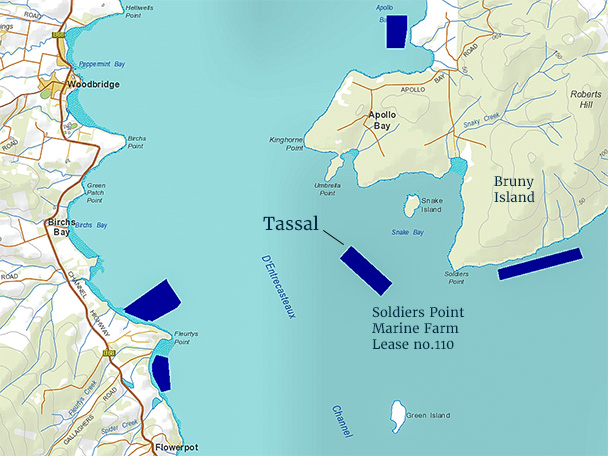Tasmanian government and Tassal criticised for pre-election secrecy over antibiotic use at Bruny Island salmon farm

Tasmania’s largest salmon company used a controversial antibiotic to control a potentially deadly fish disease just weeks before Premier Jeremy Rockliff called the state election, but the company and government made no public announcement at the time.
In response to a request by Tasmanian Inquirer, the Tasmanian Environment Protection Authority (EPA) confirmed that Tassal used 180 kilograms of oxytetracycline from January 9 to control a disease outbreak at the Soldiers Point salmon lease near Bruny Island. The salmon farm is located across the narrow D’Entrecasteaux Channel from Woodbridge, the destination for the popular Peppermint Bay tourist boat cruise from Hobart.
Gerard Castles, president of the Killora Community Association on Bruny Island, said it was alarming that Tassal’s use of an antibiotic was kept secret until after the election. “This was a deliberate act to avoid raising issues that would have been exposed to public scrutiny,” he said.
Tassal used the antibiotic to treat salmon with tenacibaculosis, a disease referred to as mouth rot.
Controversy over the use of large quantities of antibiotics at fish farms has been growing, triggered by concern about secrecy and company reports revealing residues in wild fish, including at levels exceeding the allowable level for human consumption.
“The community needs to know when public waterways are being exposed to antibiotics. It is not a closed system. It would not be tolerated on land if a neighbour was chemically treating an area of the property and allowing ‘drift’ outside their boundaries. It is the same in public waterways,” Castles said.

Map of Tassal marine farm lease no.110 (Source: LISTmap)
Tim Walsh, a professor of medical microbiology at the University of Oxford and an adviser to the World Health Organization on the emergence of antimicrobial-resistant bacteria, told a recent University of Tasmania symposium that it was “unquestionably” better to rely on vaccines than use antibiotics at fish farms.
In response to a question from Sheenagh Neill, a spokesperson for the community group Marine Protection Tasmania, Walsh said the problem with using a broad-spectrum antibiotic such as tetracycline to treat a specific disease was that it could lead to antimicrobial resistance beyond the target bacteria.
“If you can go to programs like vaccination and remove antibiotics then you remove that risk,” he said.
Tassal used the antibiotic to treat salmon with tenacibaculosis, a disease referred to as mouth rot that is caused by the marine bacteria Tenacibaculum maritimum. Symptoms of tenacibaculosis include the “erosion” of the lower jaw, ulcers and the rotting of the tail. The salmon were in three cages at the lease site.
A Biosecurity Tasmania factsheet on fish vaccines published in April 2022 did not list a vaccine for tenacibaculosis. The factsheet is no longer available on the Department of Resources and Environment website, and Tassal did not respond to a request for clarification on whether a vaccine for the disease was in use or under development.
The secret treatment
The company and the government did not announce the disease outbreak or the use of the antibiotic. Tassal updates information about antibiotic use on its website in June and December, but says it displays “visible orange signage” on the affected fish cages during treatment to notify waterway users.
Castles said residents believed the government should notify the public. “The government should proactively communicate this information and notifications of antibiotic use, fish deaths and chemical treatment to stakeholders who have an interest in a particular site. This would ensure complete transparency,” he said.
Neither Rockliff nor then opposition leader Rebecca White committed during the election campaign to notifying the public when an antibiotic was in use at fish farms.
Tassal did not respond to a request for clarification on how many fish died in the outbreak, or whether there had been previous outbreaks of tenacibaculosis at Soldiers Point or other leases.
Tassal said it would submit its antibiotic residue monitoring report to the EPA within the “regulated timeframe”, but declined to clarify when this would occur. The authority’s past practice has been to not issue any public notification when monitoring reports are published on its website.
The company said it used antibiotics “as a last resort” and that the Australian Food Standards Agency had stated there was no public health risk from consuming wild-caught fish living near fish pens.
The EPA said its responsibility was to ensure antibiotic use “does not cause environmental harm”.
“The EPA has reviewed the scientific literature in relation to the use of antibiotics in marine settings and will continue to do so, particularly as relates to the development of new technical standards for therapeutant management scheduled to commence later this year,” it said.
 @BobBurtonoz
@BobBurtonoz